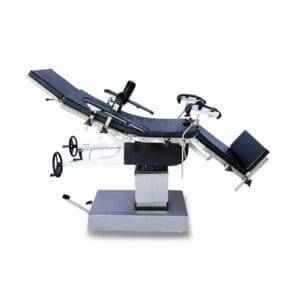Adresse
304, rue Cardinal Nord
Centre Dorchester, MA 02124
Heures de travail
Du lundi au vendredi : 7h - 19h
Week-end : 10h - 17h
In the ever-evolving landscape of medical technology and surgical procedures, one crucial aspect that often goes unnoticed is the operating table. The operating table, also known as the OT table, plays a pivotal role in the success of surgical interventions. While there are various types of OT tables available, this article will focus on manual OT tables, highlighting their key features and the numerous benefits they offer to medical professionals and patients alike.
 Manual OT tables are an integral part of any operating room. These tables are designed to provide a stable and adjustable platform for patients during surgical procedures. Unlike their motorized counterparts, manual OT tables rely on manual adjustment mechanisms, making them cost-effective and reliable options for healthcare facilities.
Manual OT tables are an integral part of any operating room. These tables are designed to provide a stable and adjustable platform for patients during surgical procedures. Unlike their motorized counterparts, manual OT tables rely on manual adjustment mechanisms, making them cost-effective and reliable options for healthcare facilities.
Let’s delve into the essential features of manual OT tables that make them a preferred choice in the medical field.
Manual OT tables come equipped with a range of adjustable features. Surgeons can manually control the table’s height, tilt, and lateral tilt to ensure the patient’s optimal positioning during surgery. This adjustability is crucial for precise surgical procedures.
One of the primary requirements for any OT table is stability. Manual OT tables are built with robust materials and sturdy bases to ensure stability during surgery, minimizing the risk of accidents or complications.
Manual OT tables are designed to support a wide range of patient weights, ensuring that they can accommodate various surgical cases, from pediatric to adult patients. This versatility is essential in a hospital setting.
Patient comfort is paramount during surgery. Manual OT tables often feature comfortable padding and ergonomic designs to minimize patient discomfort during extended procedures.
Compared to motorized OT tables, manual OT tables require minimal maintenance. This reduces downtime in the operating room and saves on maintenance costs.
Now that we’ve covered the key features, let’s explore the numerous benefits of opting for manual OT tables in surgical settings.
One of the most significant advantages of manual OT tables is their affordability. Hospitals and clinics with budget constraints can still access high-quality surgical equipment without breaking the bank.
Manual OT tables are known for their durability and reliability. They are less prone to technical malfunctions, ensuring that surgeries proceed without interruptions.
-300x300.jpg) The manual adjustment features of these tables allow surgeons to fine-tune the patient’s position with precision. This is crucial for delicate surgeries that require exact alignment.
The manual adjustment features of these tables allow surgeons to fine-tune the patient’s position with precision. This is crucial for delicate surgeries that require exact alignment.
Healthcare facilities can choose from a variety of manual OT table models, each with unique features and specifications. This allows them to select a table that best suits their specific surgical needs.
Manual OT tables are easier to clean and disinfect, reducing the risk of hospital-acquired infections. This is a critical factor in maintaining patient safety.
Let’s address some common questions about manual OT tables:
A1: Yes, manual OT tables are versatile and can be used for a wide range of surgical procedures. Surgeons can manually adjust them to meet the specific requirements of each surgery.
A2: Manual OT tables are generally more cost-effective than their motorized counterparts, making them an attractive option for healthcare facilities with budget constraints.
A3: Yes, many manual OT tables have a high weight capacity and can accommodate bariatric patients, ensuring their safety and comfort during surgery.
A4: Yes, manual OT tables are relatively easy to clean and maintain. Their simple design minimizes the need for complex maintenance procedures.
In conclusion, manual OT tables are indispensable tools in the field of surgery. Their adjustable features, stability, and cost-effectiveness make them a preferred choice for many healthcare providers. By offering precise positioning and enhanced patient comfort, these tables contribute to the success of surgical procedures while ensuring patient safety. When it comes to choosing the right OT table, manual options should not be overlooked for their many benefits in the operating room.
